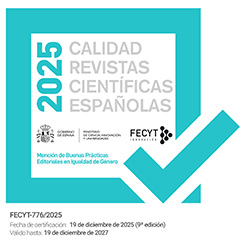Testing writing: the washback on “cambridge english: first” preparation courses in southern Spain
Abstract
This paper analyses the potential washback effect of the Cambridge English First test on language courses by considering the choice of writing tasks and the key aspects for success in the test according to learners and teachers. For that purpose, several approaches about the washback effect have been considered and they have inspired the research process, in which six institutions, 136 students and 17 teachers have taken part. After discussing the results obtained from questionnaires and teaching diaries in the light of the latest views on washback, several conclusions have been drawn. The washback effect is evident in the task types used and also in the activities considered more effective to pass the test.
Downloads
References
Alderson, J.C. “Foreword”. Washback in Language Testing. Research Contexts and Methods. Ed. L. Cheng, Y. Watanabe and A. Curtis. Mahwah, New Jersey: Lawrence Erlbaum Associates, Inc. Publishers, (2004). ix-xii.
Alderson, J.C. and Wall, D. “Does washback exist?” Applied Linguistics 14 (1993): 115-29.
Asociación de Centros de Lenguas en Enseñanza Superior CertACLES. Modelo de Acreditación de exámenes de ACLES. Salamanca: Ediciones Digitales Integradas, 2014.
Bachman, L. and Palmer, A. Language Testing in Practice. Oxford: Oxford University Press, 1996.
Bachman, L. Fundamental Considerations in Language Testing. Oxford: Oxford University Press, 1990.
Bailey, K.M. “Working for washback: a review of the washback concept in language testing.” Language Testing 13.3 (1996): 257-79.
-------. Washback in Language Testing. Princeton, New Jersey: Educational Testing Service, 1999.
Bueno González, A. “Testing English as a foreign language: an overview and some methodological considerations.” RESLA 11 (1996): 17-49.
Cheng, L. Changing Language Teaching Through Language Testing: A Washback Study. Cambridge: Cambridge University Press, 2005.
Denzin, N.K. Ed. Sociological Methods: a Source Book. Chicago: Aldine, 1970.
Ellis, R. Classroom Second Language Development. Oxford: Pergamon, 1984.
Graddol, D. English Next. London: British Council, 2006.
Green, A. IELTS Washback in Context. Cambridge: Cambridge University Press, 2007.
Haertel, E.H. “Validity arguments for high-stakes testing: in search of the evidence.” Educational Measurement: Issues and Practices 18.4 (1999): 5-9.
Hawkey, R. and Milanovic, M. Cambridge English Exams. The First Hundred Years. Cambridge: Cambridge University Press, 2013.
Heaton. J.B. Classroom Testing. Harlow: Longman, 1990.
Madrid, D. and Bueno, A.“Classroom research”. TEFL in Secondary Education. Ed. N. McLaren, D. Madrid, A. Bueno. Granada: Editorial Universidad de Granada, 2005. 641-77.
Messick, S. “Validity and washback in language testing.” Language Testing 13.3 (1996): 241-56.
Patton, M. Q. How to Use Qualitative Methods in Evaluation. Newbury Park, California: Sage Publications, 1987.
Peña Jaenes, V. Testing Writing: Washback Effect on Language Courses Trabajo Fin de Máster. Jaén: Universidad de Jaén, 2015.
Promodromou, L. “The Washback effect: from testing to teaching.”, ELT Journal 49.1(1995): 13-25.
Shohamy, E. “Beyond proficiency testing: a diagnostic feedback testing model for assessing foreign language learning.” The Modern Language Journal 76.4 (1992): 513-21.
Spratt, M. “Washback and the classroom: the implications for teaching and learning of studies of washback from exams.” Language Teaching Research 9.1 (2005): 5-29.
The Hindu (2011). “Indians among top scorers in TOEFL, GRE” The Hindu (2011). Web. 12 Feb. 2015. <http://www.thehindu.com/todays-paper/tp-features/tp-educationplus/indians-among-top-scorers-in-toefl-gre/ article2236744.ece>.
Tsagari, D. (2009). “Revisiting the concept of test washback: investigating FCE in Greek language schools”. Cambridge ESOL. Research Note s35 (March 2009): 5-9. Web. 5 Sept. 2016. <http://www.cambridgeenglish.org/images/23154-research-notes-35.pdf>
University of Cambridge Local Examinations Syndicate. Cambridge English First. Cambridge: University of Cambridge Local Examinations Syndicate, 2013.
---. Cambridge English First for Schools. Cambridge: University of Cambridge Local Examinations Syndicate, 2013.
---. Principles of Good Practice. Quality Management and Validation in Language Assessment. Cambridge: Cambridge University Press, 2013.
---. IELTS (International English Language Testing System). Web. 20 Oct. 2016. <http://www.cambridgeenglish.org/es/exams/ielts/ >
William, D. “National curriculum assessments and programmes of study: Validity and impact.” British Educational Research Journal 22.1 (1996): 129-41.
Downloads
Published
Issue
Section
License
Authors who publish with this journal agree to retain copyright and grant the journal right of first publication with the work simultaneously licensed under a Creative Commons Attribution License that allows others to share the work with an acknowledgement of the work's authorship and initial publication in this journal. Also, authors will retain the rights on their work, even if they will be granting The Grove. Working Papers on English Studies a non-exclusive right of use to reproduce, edit, distribute, publicly communicate and show their work. Therefore, authors are free to engage in additional, independent contracts for non-exclusive distribution of the works published in this journal (such as uploading them to an institutional repository or publishing them in a book), as long as the fact that the manuscripts were first published in this journal is acknowledged.

























